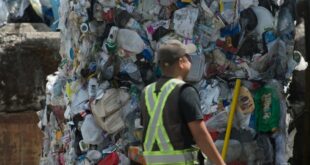Internal estimate obtained by CBC News now pegs the cost of sustaining the aircraft at $10B

The lifetime cost of buying, owning and operating the air force's troubled CH-148 Cyclones is now expected to top $14.87 billion, according to a leaked internal Department of National Defence briefing document obtained by CBC News.
Most of the expense — $10 billion — is being attributed to the cost of sustaining the aircraft. The CH-148 Cyclone is unique; no other nation flies the maritime helicopter.
The estimate is contained in a spreadsheet in a submission sent to the federal Treasury Board in late 2021, when the Department of National Defence (DND) was seeking an additional $111 million to top up the program's budget. The increase eventually was approved.
The last set of figures made available publicly on the DND and federal procurement services websites estimate the overall program cost at more than $9 billion.
The newly revised figures represent the cost of acquiring the aircraft (now pegged at $3.7 billion) and sustaining and operating the helicopter (now estimated at $11.17 billion) until the late 2030s.
The federal government already has an in-service support contract with the manufacturer estimated at $5.8 billion, which makes up part of the $10 billion figure cited in the briefing document for sustainment.
It's not clear what accounts for the difference between the $5.8 billion estimate and the $10 billion figure in the briefing document, but experts suggest it could be for support beyond 2038 because Canada has a tendency to fly its aircraft well beyond their intended lifespans.
DND blamed the most recent cost increases "on inflationary pressures" and insisted it's not paying a premium for spare parts.
Air force still awaiting delivery of last two aircraft
Despite the fact that the Cyclone procurement is a two-decade old program, the air force has yet to receive the final two helicopters out of the 28 in the original order. DND said late Thursday that it will receive the second-to-last helicopter at the end of next month and the final aircraft in 2025.
The 65-page briefing document from 2021 shows defence officials were aware at the time that completion of the final two aircraft was going to be a problem.
"There is a significant risk that the Supplier may not be able to complete the last two (2) aircraft and as a result DND/CAF may need to consider accepting those in a reduced configuration," said the briefing document, which also noted 20 per cent of the components needed to finish the helicopters have to be sourced by the manufacturer, Sikorsky.
The briefing said it was "unlikely" the contractor would be unable to find the parts it needed and went on to emphasize how important the maritime helicopters are to naval operations, now and into the future.
DND declined a CBC News request for comment from the commander of the Royal Canadian Air Force, or from other senior officials who could explain the decisions and the many other issues uncovered in the candid assessment.
Instead, it issued a written statement.
Radar warning system was never delivered
Among the major concerns cited in the briefing document was the fact the federal government paid $41.8 million for a radar warning system that was included in the cost of the original contract. In its statement, DND said the manufacturer has agreed "to provide other material for the project at a discounted price."
Sikorsky was supposed to provide the radar warning equipment under the terms of the contract but because of U.S. government technology transfer restrictions, it was unable to do so. The equipment had to be purchased separately from defence giant Lockheed Martin, which now owns Sikorsky.

Air force worried 'new' helicopter's weapons systems will be obsolete
9 days ago
A leaked internal report warns the Canadian Armed Forces Cyclone helicopters have weapons systems that are becoming obsolete, even as the military waits for delivery of the final two helicopters from the manufacturer — almost 20 years after they were initially procured.
The briefing report also noted that extra funds were needed to correct flight software, modify the flight decks of frigates and purchase more special shipboard lights and filters so that pilots wearing night vision gear aren't blinded during take-off and landing.
"I'm surprised that [the software fixes and additional equipment] appear to have, in this case, been moved outside of the ship modification package," said retired colonel Larry McWha, an aviation expert who commanded 423 Squadron when it flew CH-124 Sea Kings.
"I thought it was part of it and they should have been paid for as part of the original proposal and contract."
McWha, who has for years warned that the cost of maintaining the Cyclone would be enormous, said the numbers in the briefing still surprised him.
'They're putting as good a spin on it as they can'
"The 65-page report is fairly comprehensive. And it definitely shows that they were well aware that things were not going well," he said.
"They're trying, because this is part of a Treasury Board submission. I think they're putting as good a spin on it as they can in order to make sure that the [Treasury] Board is not given the impression that they're just throwing money into a black hole."
In explaining the background of the program, the internal briefing laid almost all of the blame for the delays at the feet of Sikorsky.
"When Sikorsky won the [maritime helicopter program] contract in 2004, the company had limited experience in the scope and depth of in-service support required by Canada, as well as limited knowledge of Canada's airworthiness system," says the briefing document.
"Sikorsky wrongly assumed that a high level of commonality between the CH148 and the civil certified S-92 would be maintained as a key to mitigate schedule risks. As a result, Sikorsky grossly underestimated the number of changes, design effort and testing required to militarize the S-92A to meet Canada's requirements."
The document also complains about the company's decision "to implement an electronic flight control system (EFCS), known as fly-by-wire," which resulted in cascading re-designs of the airframe, mechanical and electrical components.
Another defence expert said he was startled after reading that portion of the briefing.
"Does the Government of Canada bear any responsibility for this going poorly?" asked Dave Perry, president of the Canadian Global Affairs Institute, a procurement expert who has tracked the program.
"I don't find it plausible that the Government of Canada can assess nothing that they could have done better, which is how I would read this."
Officials at Sikorsky responded on Thursday evening, saying they're working diligently to finish the last aircraft and bring the fleet into full service.
"Sikorsky, our principal subcontractors, and the Royal Canadian Air Force partnered to design, develop, test, deliver and sustain a fleet of CH-148 maritime helicopters," Melissa Chadwick, a spokesperson for Sikorsky's parent company, Lockheed Martin, said in a media statement.
"As a team, we are working to overcome the remaining technical challenges to achieve Canada's unique requirements. Sikorsky continues to support the CH-148 helicopter fleet for Canada's maritime operational needs."
ABOUT THE AUTHOR
Senior reporter, defence and security
Murray Brewster is senior defence writer for CBC News, based in Ottawa. He has covered the Canadian military and foreign policy from Parliament Hill for over a decade. Among other assignments, he spent a total of 15 months on the ground covering the Afghan war for The Canadian Press. Prior to that, he covered defence issues and politics for CP in Nova Scotia for 11 years and was bureau chief for Standard Broadcast News in Ottawa.
*****
Credit belongs to : www.cbc.ca
 MaharlikaNews | Canada Leading Online Filipino Newspaper Portal The No. 1 most engaged information website for Filipino – Canadian in Canada. MaharlikaNews.com received almost a quarter a million visitors in 2020.
MaharlikaNews | Canada Leading Online Filipino Newspaper Portal The No. 1 most engaged information website for Filipino – Canadian in Canada. MaharlikaNews.com received almost a quarter a million visitors in 2020.







